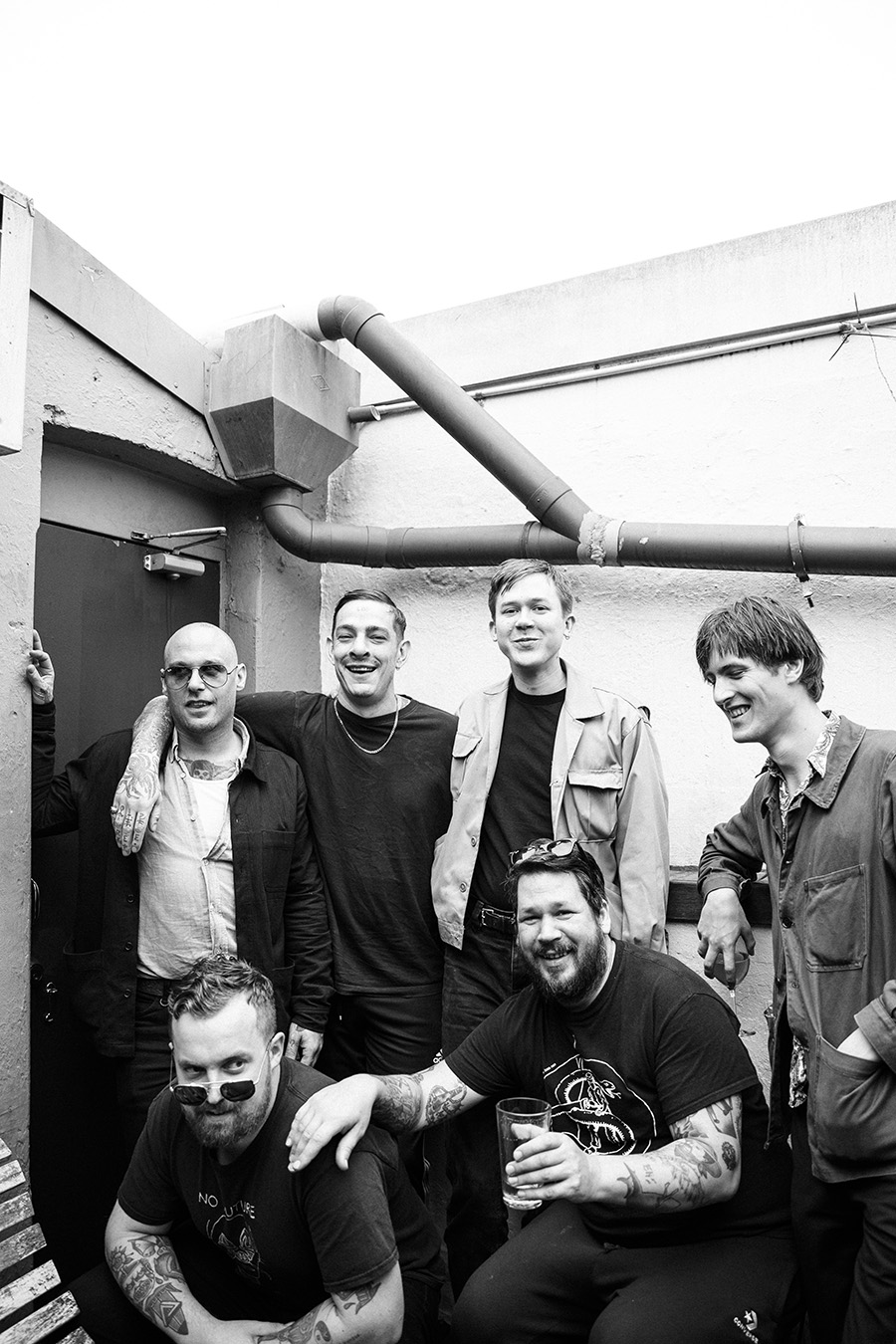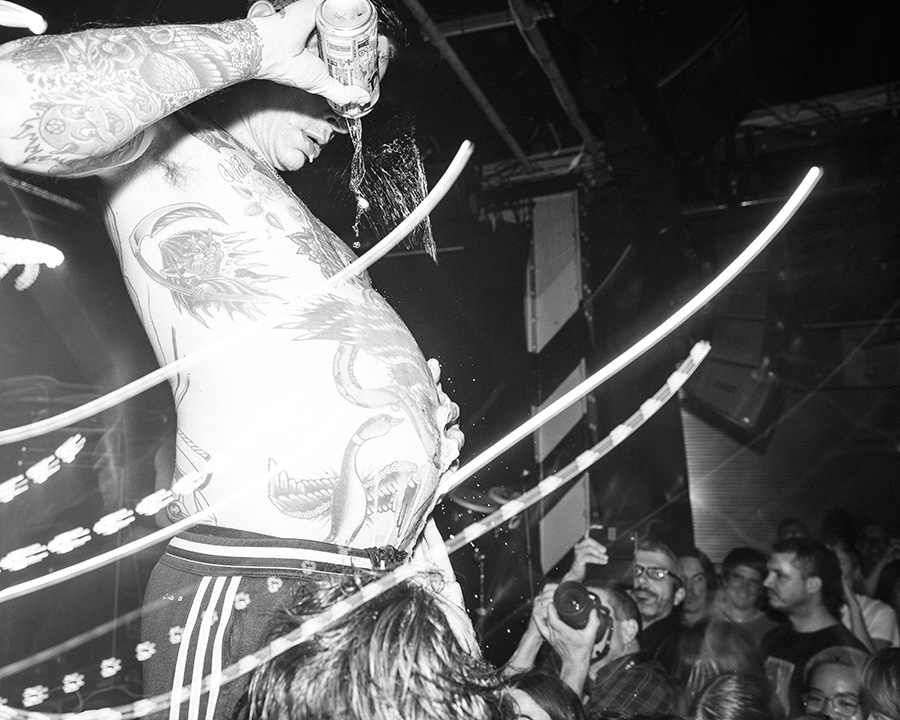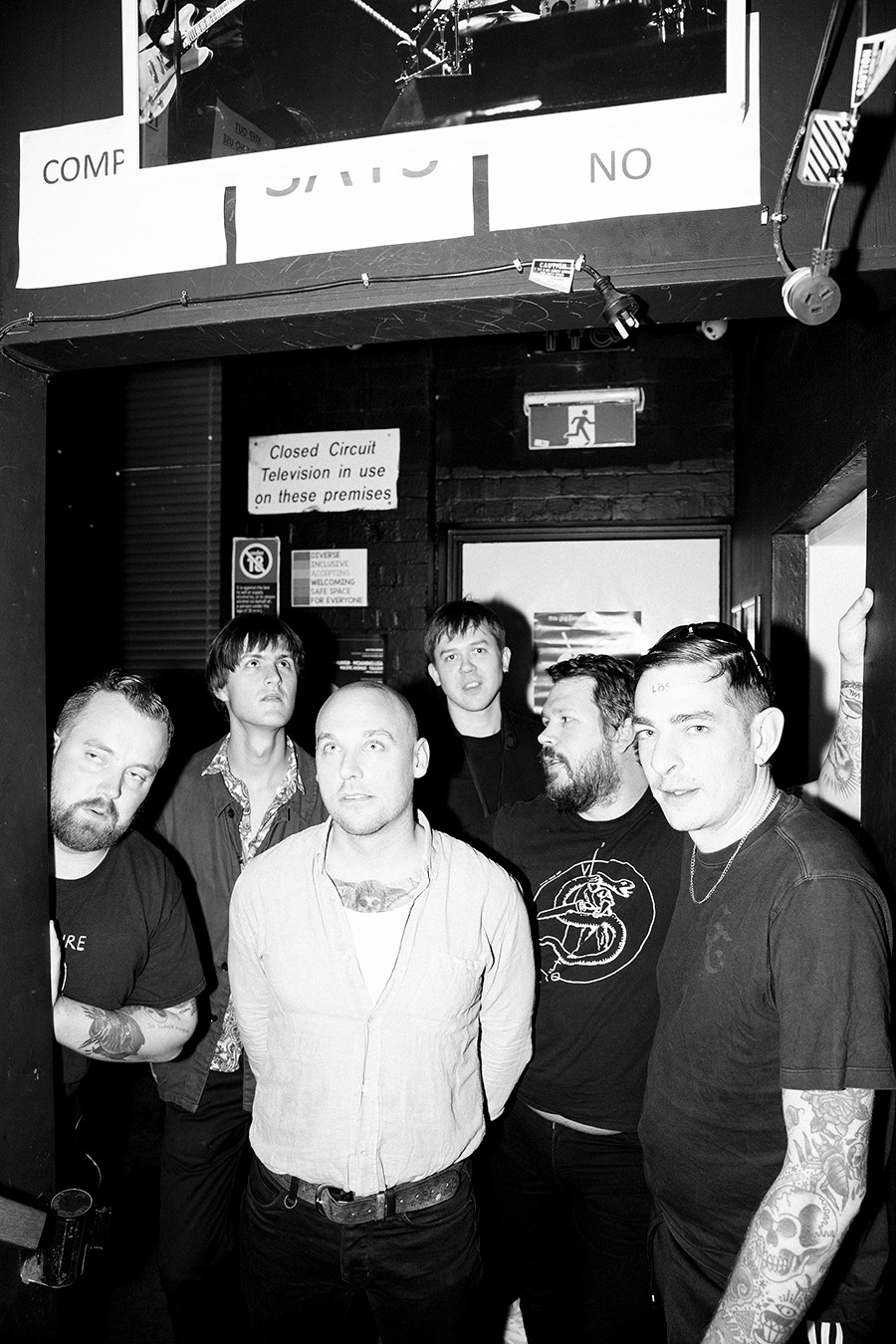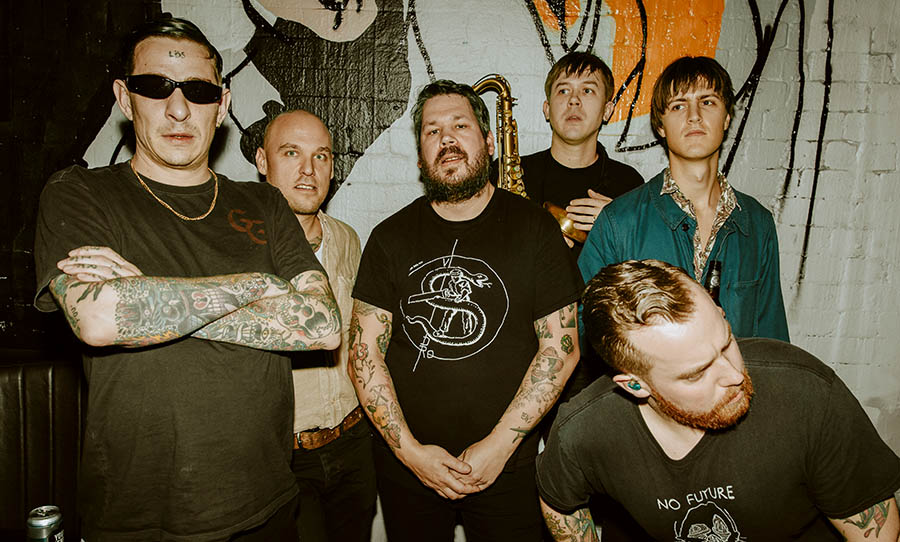We caught up with Sweden’s wildest punk exports, Viagra Boys, to chat about frustrated masculinity, sports, and shots of hot sauce.
Viagra Boys are crusaders against modern toxic masculinity, apparently. At least this is what people are saying. But speaking to the band, they don’t necessarily think this is true. Of course, they care about these issues; they face them every day. But they’re not here to make some huge political statement, even if that’s what other people—for some reason—expect of them.
Viagra Boys are taking the piss. They’re taking the piss out of hypermasculine activities and hypermasculine people. They’re here to provide some level of commentary on such issues, but they’re not here to start a movement. And that’s alright. Music is too often pushed into political realms, even if the artist has no intention of making such a statement. So Viagra Boys are adamant about the position of their music—it’s just good music, and it’s kind of a joke. So laugh.
Their debut full-length album Street Worms is full of these jokes, these piss-taking moments. But it’s also full of really great musical moments. Frontman Sebastian Murphy’s voice flips effortlessly between twisted croons and frantic wails. The instrumentation explodes into moments of pure chaos, before falling into hypnotic grooves. And of course, the lyricism is hilarious.
So while they were in Sydney touring the new album, we caught up with the band to chat about people intellectualising their music, taking the piss, sports, and doing shots of hot sauce.

~We began the interview right as drummer Tor Sjödén was explaining the Swedish expression, to “shit in the blue cupboard”~
TOR: To ‘shit in the blue cupboard’ is a Swedish expression for fucking up really badly. I don’t know why. It will all make sense at the end of tonight.
SEBASTIAN: I’ve never fucking heard that phrase before in my life.
HAPPY: Give us one example of when to use this phrase.
TOR: Well, if you were to borrow someone’s car, and you crashed it into a lamppost, you would have really shat in the blue cupboard. Or if you tell your girlfriend you’ll be home for dinner, then get home two days later…
HAPPY: That’s a big shit in the blue cupboard. I am going to start using this all the time.
SEBASTIAN: I think I will too.
HAPPY: As we’ve now established, you’re all from Sweden. How’s the music scene going over there? Any good bands we should take note of?
SEBASTIAN: No, it sucks man.
HAPPY: Are you the best band in Sweden?
SEBASTIAN: Yes, we are the best band in the north. And we suck, so it’s really saying something. But no, there’s not really much. Everyone there wants to sound pretty.
HAPPY: Even in punk music?
SEBASTIAN: Yeah, everyone just wants to get laid. No actually, there are probably some good crust bands playing in Sweden that I don’t know about. So it’s a probably. But we’re not part of any of those scenes, so we don’t know. We’ve got our own scene.
HAPPY: How did you go about creating your own scene? Because finding a spot in an existing scene is difficult enough, but starting from scratch is a lot more difficult…
SEBASTIAN: I don’t even know how it happened. We just started playing music and people liked it.
HENRIK: We played in bands a long time ago.
SEBASTIAN: Yeah, these guys played in hardcore punk bands. But people got excited about us right from the get-go. People were excited at the first gig, then it just spread by word of mouth. These guys played in a band called Pig Eyes, so people already knew who they were. That’s why people came to the show. I think that’s how it worked out.

HAPPY: Well, the fact that there was not much else going on…
SEBASTIAN: Not in that genre, at least.
HAPPY: Did that make it easier for you, do you think?
SEBASTIAN: Yeah, I think it made it easier. There were not many other post-punk bands, if that’s what you want to call it. There were lots of psych-rock, hardcore, and indie bands. That’s what people play in Stockholm, mostly.
HAPPY: What do you think it was about post-punk that didn’t gel over there before you started playing?
SEBASTIAN: I still don’t think it’s caught on just yet, but I think there’s going to be more. I think the kids are gonna do it.
HAPPY: The kids know what’s up.
SEBASTIAN: I hope so, yeah.
HENRIK: There are lots of younger people listening to post-punk now. But now, most people want to play hardcore… they want it to be fast.
SEBASTIAN: But we play slower music. Slow punk.
HAPPY: The first time I heard your band, I thought you were all American… and your father was American, right Sebastian?
SEBASTIAN: Yeah, I lived in California until I was 17.
HAPPY: Still, in the record, there are moments where you really ham up the Americanisms…
SEBASTIAN: I do, yeah.
HAPPY: Was there a specific part of American culture that you were trying to highlight?
SEBASTIAN: Yeah, I don’t know… I’ve always loved country music and the south. Southern music in general, I’ve always loved. I always try to put a bit of twang in my voice when I sing.
HAPPY: I feel like Best In Show is the point on the album where that’s most clear. Is there any element of taking the piss with all that?
SEBASTIAN: No, not really. Well, maybe in some way. I think I’m taking the piss with respect. Everything I do is a little bit ironic.

HAPPY: I’ve read a few of your interviews, and it’s been interesting listening to you talk about how music magazines—like the one I come from—project all this meaning onto your music. Even if its not your intention to convey these things…
SEBASTIAN: Oh yeah, yeah.
HAPPY: Do you enjoy it when people intellectualise your music?
SEBASTIAN: Yeah, I kind of like it. They can be smart so I don’t have to be. I don’t really think about the meaning behind shit when we make it, you know? We just make good music because we want to make good music. That’s it. People love to put meanings on stuff, so let them do it. Let them have it! It makes me sound smart, I love it.
HAPPY: I feel like, especially with post-punk music, people assume it’s a lot more intelligent than it actually is…
HENRIK: Yeah, they do. It’s stupid.
HAPPY: Well, if we may talk about the meanings to your songs for a bit…
SEBASTIAN: (Laughs) yeah, go ahead.
HAPPY: The one thing that’s always brought up about your music is that it’s attacking toxic masculinity… whether that’s intentional or not, I’m not sure.
SEBASTIAN: Yeah, that was kind of intentional. When we started, we were definitely commenting on how men suck in general. But most of that all comes from the name…
HENRIK: It’s a stupid name.
SEBASTIAN: It’s a joke. That’s the whole thing, it’s just a joke. It’s not a strong political movement, it’s just a joke. So just laugh.

HAPPY: You said that you don’t mind when people intellectualise your music… but what about when people push music that isn’t necessarily political into political spaces?
SEBASTIAN: Yeah, well that gets annoying. I mean, of course I care about all these things, but that’s not why I make music. In a way, making music in itself is a political statement. If the right-wing had their way, we wouldn’t be making music at all. They hate all this stuff, and they hate this kind of culture. So in some way, we’re political just by making music that’s ‘fuck-off’ music. We’re being political just by being ourselves – and in my opinion, that’s enough. You don’t need to dive any deeper than that. The rest of our songs are all just about getting fucked up.
HAPPY: And that’s another thing the right-wing don’t want us to do.
SEBASTIAN: (Laughs) exactly.
HAPPY: Comparing American and Swedish masculinity, do you notice any big differences?
SEBASTIAN: Oh yeah, I think as Swedes, we’re heaps further ahead with feminism in general. We don’t have to defend our masculinity so much, because we don’t give a shit. But I don’t think we have a problem with gender roles, and all that stuff… I’m not sure how to explain it.

HAPPY: There’s no frustration with gender roles…
SEBASTIAN: Yeah, exactly. There’s no frustration. I think we’re just farther ahead when it comes to the politics of men and women, and respecting the women’s movement. All that came in Sweden way before it came to America. We’re pretty liberal.
HAPPY: And you’ve got the line on Not Like You about your father never making you do sports…
SEBASTIAN: That’s very personal though. That’s just me. You know, my bassist is a huge sports fan. I hate sports.
HAPPY: How do you think sports feed into that frustrating sense of masculinity?
SEBASTIAN: Well, I think when I was younger, I was just a frustrated teenager that would rather do drugs and make art than do sports. I hated that whole culture.
HENRIK: You Australians are very good at sports. Who was that cyclist?
HAPPY: I honestly have no clue who you could be talking about. Cadel Evans? Is he Australian?
HENRIK: No, the guy who won the gold medal after everyone else fell down.
HAPPY: Oh, Steven Bradbury! That was in ice skating.
SEBASTIAN: Oh yeah, that guy’s the best. I love that guy.
HENRIK: That is one of the greatest sports moments of all time.

HAPPY: That’s the key; stick to the back and wait for everyone else to fuck up.
SEBASTIAN: That’s kind of our philosophy as a band. Stick to the back, everyone else will fall.
HAPPY: One last thing I wanted to ask you about… I read very briefly somewhere that a few years ago, while you were in AA, you started doing shots of hot sauce. Is this true?
SEBASTIAN: Oh yeah. That was when I was a rapper (laughs). But yeah, I use to do shots of hot sauce. I was a sober alcoholic for three years, but then I smartened up and started drinking again.
HAPPY: The hot sauce got you through it.
SEBASTIAN: Yes, the hot sauce got me through that period.
HAPPY: Did it fuck up your guts?
SEBASTIAN: Yeah, I have horrible heartburn and I puke every morning.
HAPPY: All from the hot sauce days?
SEBASTIAN: All from the hot sauce days, yeah. I burnt a hole in my stomach.
HAPPY: Damn, the hot sauce days sound like a dark period.
SEBASTIAN: Yeah man, it was a tough time. I don’t want to talk about the hot sauce days. Don’t bring that up again.



